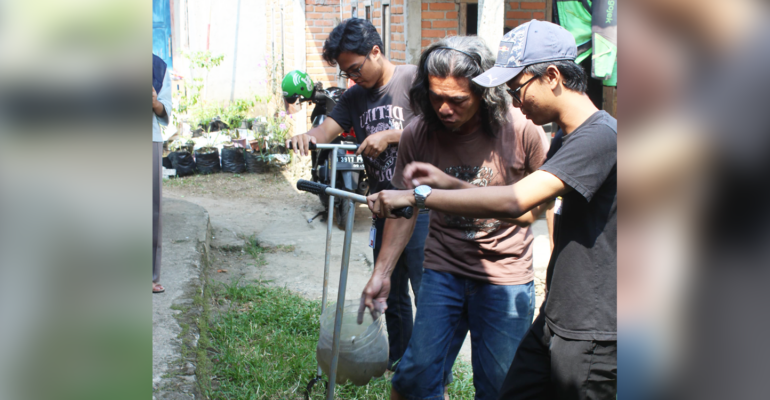Towards Climate Village in Leuweung Kolot Village, PPK Ormawa HMIT IPB University Makes 61 Biopore Infiltration Holes

The Soil Science Student Association (HMIT) IPB University through the implementation team of the Student Organization Capacity Strengthening Program (PPK Ormawa) together with Leuweung Kolot Village residents have made more than 61 biopore infiltration holes spread across 22 RTs. This program is one part of the process of realizing a Climate Village in Leuweung Kolot Village, Cibungbulang District, Bogor, West Java.
The program of making biopore infiltration holes took place from July 27 to August 6, 2024 which was attended by each RT head and RW head of Leuweung Kolot Village. Not only practice, IPB University students also provide socialization on how to use tools and make biopore infiltration holes correctly.
Biopores are small holes or cavities formed due to the activity of organisms in the soil. The existence of biopores is then utilized in making biopore infiltration holes on cylindrical holes made vertically. The depth of the infiltration pit is around 100 cm or not exceeding the depth of the water table with a diameter of 10 to 30 cm. The hole is then filled with organic waste to encourage the formation of biopores with the aim of increasing soil porosity in conducting water.
These biopore infiltration holes can also utilize organic waste in the formation of organism activities in the soil. Organisms that eat organic waste will form biopore holes that support the storage of water reserves in the soil.
Leuweung Kolot Village, which is experiencing problems with low water availability, can utilize this biopore infiltration pit to increase its water supply. In addition, the people of Leuweung Kolot Village no longer need to dispose of their household waste, especially kitchen waste into the river or sewers, but can be put into the biopore infiltration holes.
Not only making 61 biopore infiltration holes, the PPK Ormawa HMIT IPB University implementation team also entrusted 5 biopore drills to RW representatives in Leuweung Kolot Village to support program sustainability.
“We hope that by leaving this tool can support the sustainability of the program and the community can easily use the tool to make biopore absorption holes independently in accordance with the procedures that our team has socialized,” said Syamil Azam, one of the members in charge of the biopori program.
One of the community leaders, Heru, chief of RW 06, expressed the benefits felt from this biopore infiltration hole making program. “Alhamdulillah, after the holes were punched, there were benefits for the community, especially in RT 01 RW 06. From previously there was no water, now the well is thankfully starting to have water because three days ago there was rain too. I definitely agree with the sustainability of this biopore infiltration pit because initially the community’s understanding of biopores was lacking,” he said.
“For these weeks we will move with the heads of RTs in punching biopores into people’s homes. The understanding that IPB University students provide is also easy to understand because it goes directly to the community,” he added enthusiastically. (*/Rz) (IAAS/Hap)



